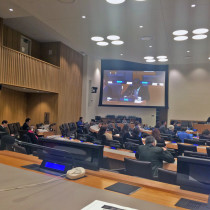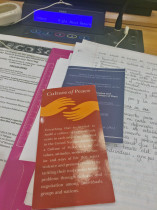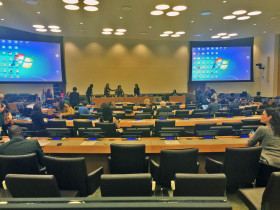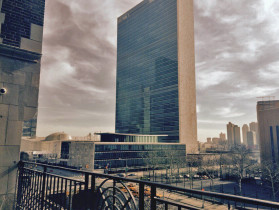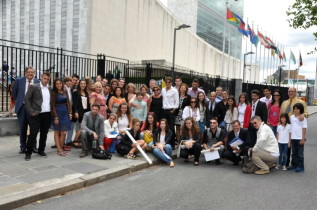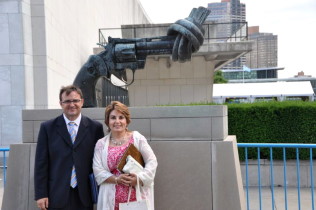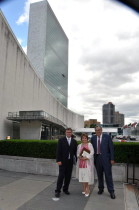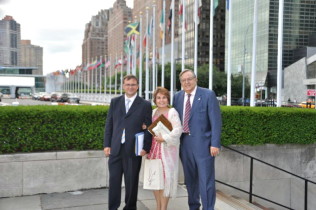Diálogo de la Sociedad Civil en su posicionamiento a largo plazo de Sistema de Desarrollo de las Naciones Unidas.
Reunión del 28 de abril de 2015.
Diálogo de la Sociedad Civil en su posicionamiento a largo plazo de Sistema de Desarrollo de las Naciones Unidas.
La exposición del tema estuvo a cargo de diferentes representantes de misiones de países ante la ONU así como representantes de organismos no gubernamentales entre otros.
Todos hablaron de cómo debería ser para ellos el sistema de desarrollo del ECOSOC, es decir sentar las bases para que el desarrollo de los programas de ayuda al desarrollo económico y social de los países sea lo más eficaz y seguro posible.
El debate fue muy teórico porque se trataba de establecer las reglas del juego, de hecho alguno de los ponentes dijo que igual se debería hablar un poco más de los resultados y no tanto de las reglas del programa a lo que alguien contesto que a veces establecer las bases es un resultado en sí mismo.
Para ello hay que tener en cuenta factores como la financiación, la estructura de Gobiernos, la capacidad e impacto de las Naciones Unidas, etc.
Se habló de la importancia de las alianzas: entre los filántropos, entre organizaciones afines (para aprovechar medios, capacidad técnica… ejemplo Save the children y Unicef), vamos, que la unión hace la fuerza.
El programa de la ONU para el desarrollo ha de ser ambicioso y por ello la rendición de cuentas es muy importante: da seguridad, transparencia y confianza en los proyectos.
A la hora de actuar, la ONU debe coordinar las decisiones económicas y sólo ella lo puede hacer por ser un organismo universal y neutral. En los países donde se lleven a cabo estos planes se debe garantizar la paz y la seguridad e integrar los Derechos Humanos.
El desarrollo debe ser sostenible (hay que mantener el objetivo del 0,7 % en cooperación) y tener mucho cuidado con las deudas, para que no sean irresponsables y estén siempre controladas. La ONU debe intervenir para evitar el Dumping.
El sector privado es muy importante y hay que considerarles a ellos también responsables aunque son los gobiernos los que deben lograr los objetivos de desarrollo sostenible: son responsables ante los ciudadanos que los eligieron.
Los proveedores de los servicios han de ser controlados especialmente
Por último se habló de que, como en esta sesión, hay que compartir ideas y compartir esfuerzos entre las distintas organizaciones para lograr los objetivos establecidos.
Civil Society dialogue on its long term stance at the United Nations development system.
The topic was introduced by representatives from diverse countries’ missions to the United Nations, as well as by representatives from non-governmental organisations, among others.
They all expounded their views on how the ECOSOC development system should be, that is, to lay the foundations for the countries’ aid programs for the economic and social development to be as efficient and safe as possible.
The debate was quite theoretical, as its purpose was to establish the rules to follow. In fact, some of the speakers claimed maybe it would be better to focus more on results, and not so much on the program’s rules. Some replied that in certain occasions setting rules is a result itself.
Therefore, factors such as funding, Government structure, UN’s capacity and impact, among others, are to be taken into account.
The importance of alliances was also a topic of debate: alliances between philanthropists, between similar organisations … This is a way of making the most of resources and technical capacity, among others. There is an example thereof in the alliance between Save the Children and UNICEF. All in all, achieving strength through unity.
The UN’s Development Program has to be ambitious, and therefore giving account is quite important: It is reassuring, open and transmits security and confidence in projects.
When time comes for action, the UN must coordinate the economic decisions, and only the UN can do so, since it is a universal and neutral body. In the countries where this program is carried out peace and security must be guaranteed, and Human Rights must be integrated.
Development must be sustainable (the 0.7% target in development cooperation ought to be kept), and special attention must be paid to debts, so that they aren’t irresponsible and are always controlled. The UN must act to avoid Dumping.
The private sector is of huge importance, and has to be held accountable as well, although it’s Governments who are responsible of achieving the Sustainable Development Goals: they are accountable before the citizens that elected them.
Services providers must be specially controlled.
Finally, it was also mentioned the need of sharing ideas and efforts among organisations with the aim of achieving the targets that have been set.


